


Since 27 September 2020, the clashes between Armenia and Azerbaijan in Nagorno-Karabakh have renewed. Both sides blame each for starting the military campaign. Russia and Turkey, that are primarily interested in this conflict, together with the international community closely observe the developments on the place. Georgia’s official position has not changed since the day of the start of the war – country maintains neutrality, which has no alternative in this situation. The Prime Minister of Georgia also offered Armenia and Azerbaijan to hold peace talks on the territory of a neutral side, Georgia. Still, since the day of the renewal of military campaign, disinformation about Georgia’s position on Karabakh conflict has been spread in Armenian and Azerbaijani media.
On 28 September, in Ninotsminda, Javakheti, local population collected products and various belongings to send them to Karabakh. However, the trucks loaded with these products were not allowed to cross the Georgian-Armenian border, which was followed by a demonstration of locals. Later, Georgian border-guards let the two trucks loaded with food and medical products pass the border while the four trucks, that were loaded with tires, were told that they would be allowed to pass the border after receiving relevant permission. After this, the demonstrators dispersed and the road was opened. However, since 29 September, the spread of disinformation regarding the events in Georgia has started in the Armenian as well as Azerbaijani-language media and social networks.
Since 29 September, Armenian, Russian and Georgia-language posts have appeared on Facebook, accusing Georgia of enabling Turkey and Azerbaijan to transport Turkish arms to Azerbaijan through Georgian territory.
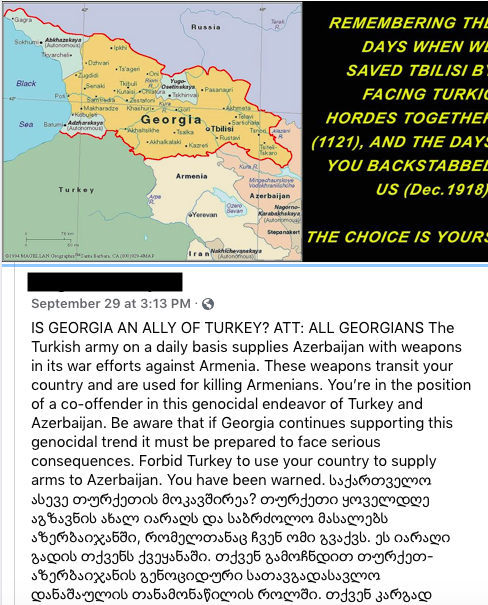
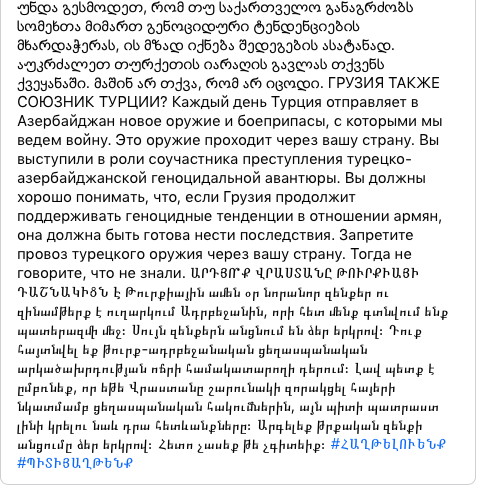
Source: The post of Facebook user. 29 September 2020
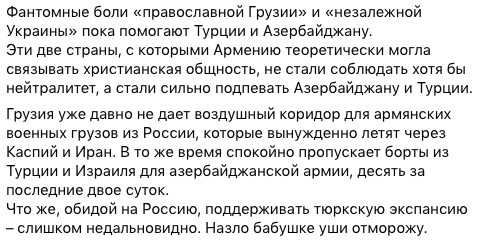
Source: Excerpt from the post of one of Facebook users. 29 September 2020
After such information appeared in social media, the situation in Javakheti still became tense. On 29 September, the local population blocked the central road connecting Georgia with Turkey in the village, Kartsakh, neighboring Turkey. For some time, they interrupted the cars travelling from Turkey to Georgia. As a local publication Samkhretis Karibche reports, local population protested the fact that Georgia did not allow them to help Armenian soldiers and victims while the road for Azerbaijan was easily opened. It is notable that, according to the demonstrators, they received the information that Georgia opened the road for Azerbaijan from social media. For instance, Samkhretis Karibche quotes one of the demonstrators: “We read on Facebook that Georgia opened the road for Azerbaijan easily while we hardly managed to send food yesterday. We want to know why Georgia does not allow us to help Armenian soldiers”. Also, AliQ Media reported that according to one protester, they decided to block the road due to the fact that the arms were sent to Azerbaijan from Turkey through Georgia. The TV channel ATV 12 based in Akhalkalaki quoted the phrase of one of the demonstrators: “Our goal is not to allow the transportation of arms from Turkey to Azerbaijan”. Soon, similar information was spread in Armenian media as well. [1]
Already on 30 September, Armenian politician, head of the Republican Party of Nagorno-Karabakh, Karen Ohanjanyan published similar disinformation on his Facebook account, arguing that Georgia passes military goods from Turkey to Azerbaijan and stated that Javakheti should declare independence from Georgia. Ohanjanyan’s statement is a clear example showing the scale of disinformation concerning Georgia in Armenian information space. This negatively affects not only the population but the officials as well. Even though later Ohanjanyan toned down his statement and expressed his positive attitude toward Georgians, his first statement is still being actively spread in social media, which causes acute reactions from Georgians as well as Armenians.
Meanwhile, the new disinformation appeared in Azerbaijani media, arguing that in the support of Azerbaijan, Tbilisi TV Tower and Liberty Bridge were lightened in the colors of Azerbaijani flag. First, this disinformation was published by the Azerbaijani website Oxu.az and then it became viral as it was shared by the different Azerbaijani and Armenian media outlets.
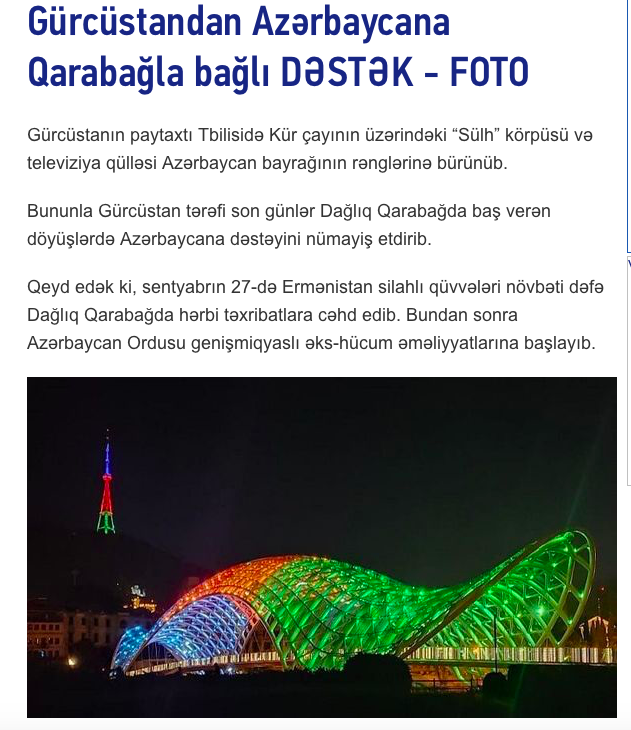
Source: Oxu.az
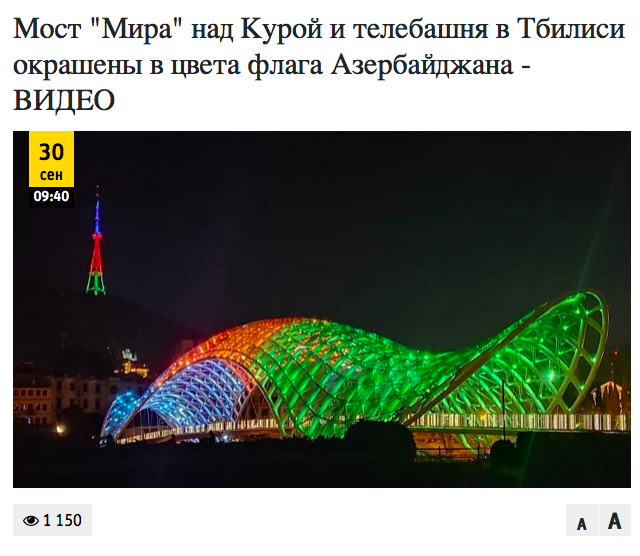
Source: ru.baku.ws
In fact, of course, after the renewal of armed conflict in Karabakh, neither the Tbilisi TV Tower nor the Liberty Bridge was lightened in the colors of Azerbaijani flag. The last time this happened was on 28 May 2020 when Azerbaijan celebrated the establishment of the First Democratic Republic. The photo published by Oxu.az depicts the Tbilisi TV Tower the Liberty Bridge lightened on this day.
As for the Georgian media outlets that have been mentioned to spread anti-Western and pro-Russian disinformation for years [2], after the renewal of conflict in Karabakh, the information propagated by them has been focused on the spread on anti-Western and anti-Turkish messages.
For instance, NewsFront actively published articles and quotes in which the west was accused of the developments in Karabakh. NewFrontpublished Georgian writer, Goga Lortkipanidze’s Facebook post: “The destroyers of the Soviet Union, regardless of their national of party affiliation, are fully responsible for the ongoing and extremely dangerous phase of the conflict between Armenia and Azerbaijan (as well as the Georgian-Abkhazian, Georgian-Ossetian, Russian-Georgian, Russian-Ukrainian and other similar conflicts). It is highly logical and natural that from the killers of the USSR they have transformed into the killers of human beings”. Also, NewsFront published an article by Revaz Kilasonia, in which he argues that the Karabakh conflict is only in the interest of the USA, not Russia.
Moreover, in the Georgian social media, the information, that as if the Armenian PM, Nikol Pashinyan talked about the Bagramyan battalion and its participation in the war of Abkhazia against Georgia, dated back to 5 May 2018, re-emerged. According to this disinformation, Pashinyan said: “The participation of Bagramyan battalion against Georgia was Armenians’ fateful mistake, which has affected Georgian-Armenian relations”. In the interview with Netgazeti in 2018, Pashinyan’s office declared it was disinformation that PM made such a statement. However, on 29 September 2020, the same information was republished on Facebook by the pages: Tanamoazreta Gaertianeba – Sakartveloand Dedakalaki.
As observed by the Myth Detector, together with the Facebook pages, the disinformation was shared in the open groups, including: Leaders with Mikheil Saakashvili, Mile-New-Mi, Gavertiandet mtris tsinaaghmdeg da mishaseuli tsinsvlis dasabruneblad!, Free Caucasus, Omis veteranebi, Sazghvris mighma, “Apkhazta kreba”, Dzala ertobashia, Live Georgia.
The new wave of disinformation related to the Karabakh conflict in Armenian, Azerbaijani and Georgian media is extremely dangerous as it can foster hostility between ethnic Armenian, Azerbaijani and Georgian citizens of Georgia. Moreover, it can negatively affect Georgia’s relations with its neighbors, Armenia and Azerbaijan while Georgia’s neutrality is of paramount importance for maintaining stability in the South Caucasus.
Even though on 4 October, the Deputy Minister of Foreign Affairs of Georgia, Lasha Darsalia made an official statement about the disinformation related to the transfer of arms through Georgia, such statements cannot be enough for countering the new wave of disinformation. Moreover, considering the fact that the disinformation has been spread in social media since 29 September, it can be argued that the above-mentioned statement is a delayed response from the government. This problem requires a proactive approach and active communication with the ethnic minorities of Georgia as well as international partners. Amid the existing tensions and information warfare, the Institute for Development of Freedom of Information (IDFI) calls the Government of Georgia to engage in more active communication with the local population as well as international partners and ensure the timely and comprehensive information campaigns regarding the ongoing processes in the region as well as Georgia’s official position and the relevant actions taken by the country.
_____
[1]See for instance: https://armenpress.am/rus/news/1029534/; https://www.lragir.am/ru/2020/09/30/184889/; https://a1plus.am/ru/article/380450; https://www.7or.am/ru/news/view/197806/
[2]See:: https://idfi.ge/ge/russian-influence-of-georgian-ngos-and-media; http://www.mdfgeorgia.ge/eng/view_research/169

This material has been financed by the Swedish International Development Cooperation Agency, Sida. Responsibility for the content rests entirely with the creator. Sida does not necessarily share the expressed views and interpretations.